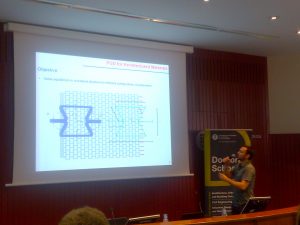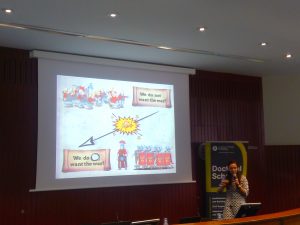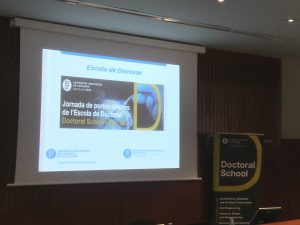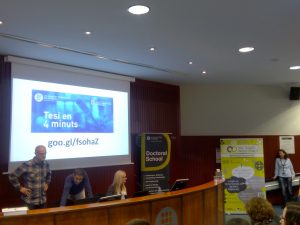There are some moments in a PhD student career that everyone experiences sooner or later, like for example the first official conference where one has to present his/her work to the scientific community.
My very first talk was in Nantes when I was still a master student. Among all the questions running in my head (“Will I be clear enough?”, “Will my presentation be catchy?”, “Will they find it interesting?”, “Will I be able to answer to all their questions and clarify their doubts?”), there was one that made my talk a real challenge: “Will I be able to tell what I want within the time at my disposal?”.
Usually one is given 15-20 minutes and in order to achieve this goal, must stay focused the whole time of the talk. But let’s imagine for a moment you have to present your work in only 4 minutes… Would it be better or worse? 😮
That’s the challenge of the competition organised by the Catalan Foundation for Research and Innovation (FCRi) in which 12 universities in Catalonia take part: among them, the Universitat Politècnica de Catalunya (UPC), in Barcelona, where I am doing my PhD.
The Catalan inter-university final is going to take place in June and in this respect a UPC final was held beforehand, in order to elect the student representing UPC. The internal competition took place on 17th May during the Open Day organised by the Doctoral school, which aimed to present the PhD opportunities to master students and everyone else willing to start doing research. It was a great idea to include the contest in the Open Day program: this way one could ask UPC staff for information about all the scientific areas available and, meanwhile, listen to 14 current PhD students from all over the world presenting the objectives and difficulties of their work in various fancy forms. Precisely, I’d like to talk about two of these students, whom I personally know.
Alberto Pedro Sibileau, from Argentina, is a SEED student and is part of LaCàN lab at UPC, as I am. His project focuses on the use of PGD (Proper Generalised Decomposition) technique in Architectured Materials and how to solve equilibrium in material structures defined by different configurations of parameters.
Since every single change of the parameters yields a structure with different features, he needs to get access to a big amount of data and it’s for this reason that he employs PGD technique, because it will speed up the simulations and provide him with more results in a shorter time.
During his talk, Alberto showed a honeycomb structure, in which hexagons could be stretched or shrunk at will by just modifying one or more parameters. The configurational changes of the structure were shown by means of an animation and in my opinion, this was an original way to let people better understand the problem on which he is working.


Tetiana Klymchuk, from Ukraine, is enrolled in the PhD in Applied Mathematics at UPC and is one of my classmates from the Catalan language course. During her talk, she pointed out the importance of mathematics in many engineering applications, like Cryptography.
When two entities are communicating and do not want a third party to listen in, what they do is to make their message somehow hard to be understood by others (we say they encode the message). To this purpose, cryptography uses encryption, a reliable technique that makes data hard to read by an unauthorized part. It involves a lot of maths concepts and one should be very careful when encoding and decoding (get back to the information understandable by the receiver) something.
Tetiana explained clearly this problem by showing what could happen if, in the sentence “We do not want the war!”, the piece of information related to the NOT part would be badly encoded, decoded or both.
At this point, I’d like to highlight two points related to the contest.
- It was a very big challenge for all the participants: they had to achieve all the objectives I introduced at the beginning of the post (except the one related to clarify doubts, as no extra time was scheduled for questions) in just 4 minutes.If I had to give an answer to the question I was wondering some lines above, “Would it be better or worse to present your work in so little time” and moreover, to a non-scientific public, I would say it is a dare with yourself: of course, you cannot explain all the details of your project, but this does not prevent you from giving an impressive and remarkable talk able to reply to the most important issues, that are what the problem is, why we cannot solve it with the tools so far available in literature and how my research can help and give a solution to it.
- I think all the candidates reached the main goal of the contest, that was to motivate students keen on scientific research to start a PhD career.With UPC providing Doctoral Studies in Applied Mathematics, Architecture, Business Administration and Management, Engineering and many other areas, I’m quite sure anyone with a strong passion for scientific research will be able to find the PhD most suitable for him/her.
I find that carrying out a PhD is an amusing job: I feel thrilled when I think about myself as a young researcher and every day I go to work looking forward to discovering which challenges, issues and hopefully results the new PhD-day holds for me. In the meanwhile, I’m learning new things concerning a topic in which I am interested.
Is there anything better than working on what you’re passionate about? 😉
I wish everybody to find the right way forward to pursue their goals!


By the way, next year I will take part to the “Thesis in 4 minutes” contest as well!
